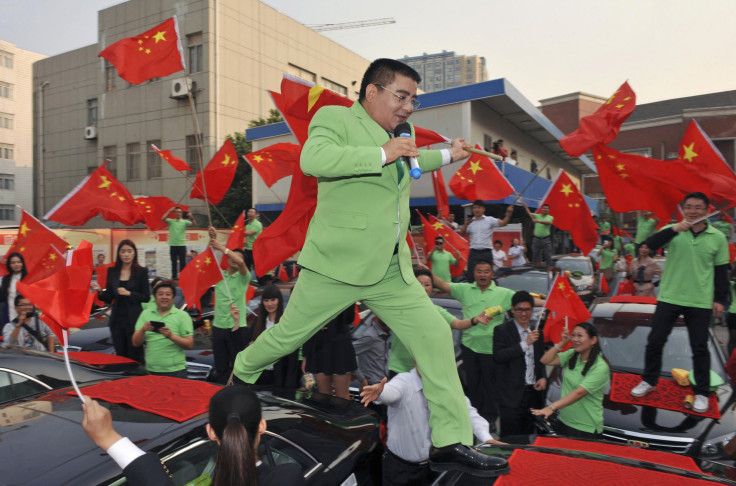Meet Chen Guangbiao, China's Singing Millionaire Who Plans To Buy A New York Media Company [VIDEO]

CAMBRIDGE, Mass. -- Cheering filled the room as the music started to play. The star-struck audience hooted and hollered as they raised their smartphones and began snapping pictures and videos.
But this wasn’t a sold-out concert arena, and the performer was far from a platinum-selling singer. This was Harvard, and the center of attention was a 45-year-old hyperwealthy Chinese man most famous for saying he wanted to buy the New York Times.
The man of the hour was Chen Guangbiao, and he was singing a song he wrote himself, titled “My China Dream” -- a play on President Xi Jinping’s own reform concept. The rapt audience in one of Harvard University’s science auditoriums included mostly young Chinese students and professionals gathered for the forum, one that asked an important, if ambiguous, question: “Can China Lead?”
Among the top executives and dozens speakers at the event, Chen was the top draw; he’s the CEO of Jiangsu Huangpu Renewable Resources Ltd. Co., a philanthropist and nothing short of a top celebrity in China’s yuppie community.
The cheers that followed his performance would have fooled a passerby into thinking Justin Timberlake had made an appearance in one of Harvard Science Center’s auditoriums.
“I love you!” a young woman screamed, after most of the applause died down.
“Thank you, I love you, too!” Chen responded.
Hordes of suited-up students crowded around Chen when he arrived at the Charles Hotel for the conference’s opening. He happily obliged his fans, posing for photos, shaking hands, and waving -- everywhere he went, a crowd of flashing smartphone cameras followed. People in the entourage that accompanied him even handed out free tote bags emblazoned with his name, each containing, among other things, a copy of an autobiographical book and a CD of him reciting poetry.
Over the weekend, Harvard University’s annual China Forum drew several hundred participants from all over the U.S., originally hailing from most corners of China, as well as big names in business, politics and academia. Even in this illustrious company, Chen still managed to draw most of the attention.
Chen is known for being a jack-of-all-trades. His business card, which famously went viral, boasts several titles ranging from “China Earthquake Rescue Hero” to China’s “Most Charismatic Philanthropist.” Though Chen can now add “Singer” to his already loaded business card, he is looking to take on his next big endeavor: owning a New York-based digital media company.
This isn’t the first time Chen has openly expressed interest in media. Last winter, New York Times executives reportedly had a meeting with Chen, who earned most of his fortune -- which was reported to be roughly $740 million in 2012 -- as the CEO of his recycling company. The New York Times and Chen did not make a deal, but that hasn’t stopped him from pursuing other American publications.
During an interview at the Forum, Chen revealed that he was in talks to acquire an unidentified New York-based news website for an asking price of $100 million, adding that he had learned from the failed New York Times discussions.
Chen in general has an interest in New York, even saying that he will hold a huge charity drive to help feed New York’s homeless in June, which perhaps will earn him some local recognition.
He also doesn’t specifically have any experience in media aside from occasionally being at the center of its attention. Chen is well-known for his often eccentric behavior. He made headlines in the past by handing out canned “fresh air” on a particularly smoggy day in Beijing, with a larger goal of drawing support for environmental reform.
“It’s hard to be a good philanthropist in China,” Chen said of some of his work. “But I have to keep doing it.” He says he consistently donates 60 to 70 percent of his annual profits to charities and is a champion of environmental sustainability, and he is often photographed visiting and donating money to villages and citizens in need.
With a growing abundance of wealthy Chinese, merely having money won’t impress a roomful of Chinese students and professionals at Harvard University. But being a controversial singing-CEO-philanthropist-celebrity millionaire with a crowd of groupies at an academic conference at one of America’s most elite schools is a good way to stand out -- and maybe even get one’s hands on a digital media company.
© Copyright IBTimes 2025. All rights reserved.





















